Related Research Articles

Madurai Shanmukhavadivu Subbulakshmi was an Indian Carnatic singer from Madurai, Tamil Nadu. She was the first musician ever to be awarded the Bharat Ratna, India's highest civilian honour. She is the first Indian musician to receive the Ramon Magsaysay award in 1974 with the citation reading "Exacting purists acknowledge Srimati M. S. Subbulakshmi as the leading exponent of classical and semi-classical songs in the carnatic tradition of South India. She was the First Indian who performed in United Nations General Assembly in 1966."
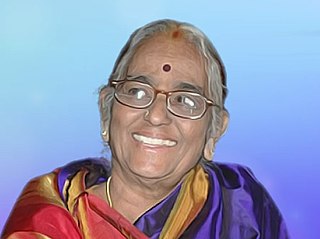
Vidushi R. Vedavalli is a Carnatic vocalist.

Ariyakudi Ramanuja Iyengar, popularly known as Ariyakudi, was a Carnatic music vocalist, born in Ariyakudi, a town in the present-day Sivaganga district of Tamil Nadu. Ariyakudi developed a unique style of singing which came to be known as The Ariyakudi Tradition and is followed by his students. He is credited with establishing the modern katcheri (concert) traditions in Carnatic music.

Veenai Dhanammal (1867–1938) was a highly accomplished Carnatic musician, and the torchbearer of the school of Carnatic music that goes by her name. She was both a vocalist and a performer on the Saraswati veena. The prefix "Veenai" in her name is an indicator of her exceptional mastery of that instrument.

Sindhu Bhairavi is a 1985 Indian Tamil-language musical drama film written and directed by K. Balachander. The film stars Sivakumar, Suhasini and Sulakshana. It revolves around the three lead characters: a Carnatic singer J. K. Balaganapathi (JKB), his wife Bhairavi, and his girlfriend Sindhu. At the peak of his career, JKB gets addicted to alcohol following complications with his affair, and his career goes into a downward spiral.

Lalgudi Gopala Jayaraman was an Indian Carnatic violinist, vocalist and composer. He is commonly grouped with M.S. Gopalakrishnan and T.N.Krishnan as part of the violin-trinity of Carnatic Music. He was awarded Padma Bhushan by the Government of India in 2001.

Madras Lalitangi Vasanthakumari was a Carnatic musician and playback singer for film songs in many Indian languages. MLV and her contemporaries D. K. Pattammal and M. S. Subbulakshmi are popularly referred to as the female trinity of Carnatic Music. A prime disciple of G. N. Balasubramaniam, she was the youngest among the established musicians of that era, and was the youngest female to receive the Sangita Kalanidhi award. In 1967, she was honored with the Padma Bhushan, the third highest civilian award by the government of India. Her daughter, the late K.Srividya, was an actress in Tamil and Malayalam languages.

Thetakudi Harihara Vinayakram, also known as Vikku Vinayakram, is an Indian percussionist. He is also known as the God of ghatam. He plays Carnatic music with the ghatam, an earthen pot, and is credited with popularising the ghatam.

"Bombay" Jayashri Ramnath is an Indian Carnatic vocalist, singer, and musician. She has sung in multiple languages including Tamil, Telugu, Kannada, Malayalam and Hindi movies. Born into a family of musicians, Jayashri represents the fourth generation of music practitioners in her family. Trained by Lalgudi Jayaraman and T.R. Balamani, she was awarded India's fourth highest civilian award, the Padma Shri, in 2021. She has become one of the most sought after Carnatic musicians today.

Sangita Kalanidhi Aruna Sairam is an Indian classical vocalist and carnatic music singer. She is a recipient of the Padma Shri award from the Government of India and was elected as the Vice Chairman of the Sangeet Natak Academy by the Government of India until 2022. In 2011, Aruna was the first Carnatic musician to perform at the BBC proms in London. She is also the first Carnatic musician to perform in Oud Festival of Israel (Jerusalem).

“Kalaimamani” Gayathri Girish is a Carnatic vocalist. Her introduction to music began as a child at the age of 6 years under the guidance of her mother Padmini Srinivasan. She subsequently came under the tutelage of Vidwan Vaigal.S.Gnanaskandan and Padma Bhushan, Sangeetha Kalanidhi Madurai T.N.Seshagopalan. She is an “A-grade” artiste of All India Radio, Chennai and performs for Doordarshan and other private television channels. She specialises in lecture-sessions, thematic multi-media presentations integrating Bhakti and Carnatic Music and lecture-demonstrations. She undertook an archival project for Doordarshan - Podhigai TV titled “Azhwargalum Amudha Tamizhum” to render the Azhwar Pasurams on DD Podhigai television every week for 8 consecutive years. She also serves on the artist panel for the ICCR which is an autonomous organisation of the Government of India, involved in India's external cultural relations, through cultural exchange with other countries and their peoples.
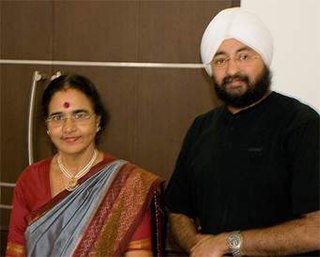
N. Rajam is an Indian violinist who performs Hindustani classical music. She remained professor of music at Banaras Hindu University, eventually became head of the department and the dean of the Faculty of Performing Arts of the university.
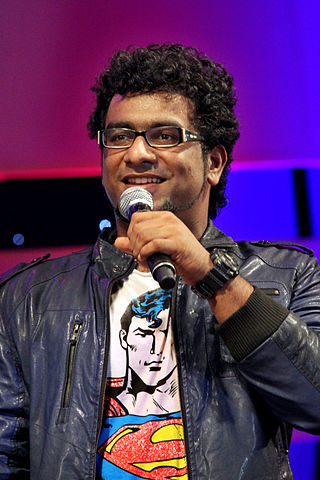
Haricharan Seshadri, known mononymously as Haricharan, is an Indian Carnatic vocalist, playback singer, and musician who predominantly works in Tamil, Malayalam and Telugu music and cinema. He sung 2000 songs in films, albums etc.

Leela Omchery is a classical singer, musicologist and writer. She is known for her contributions to classical music and is a recipient of Padmashri award from Government of India for her contributions to Indian classical dance and music.

Vidushi Sumitra Guha is an Indian classical vocalist, known for her expertise in the Carnatic and Hindustani schools of classical music. The Government of India honored her in 2010, with the fourth highest civilian award of Padma Shri.
N. Kesi was an Indian Carnatic flautist and was a student of T. R. Mahalingam.
N J Nandini is a Carnatic music vocalist from Trivandrum. Nandini was awarded the Chembai Puraskaram, the Isai Chudar title and a M S Subbalakshmi fellowship at the young age of 23. Nandini, who comes from a family that has a musical lineage, has been nurtured by gurus such as Prof Parassala Ponnammal, Prof P R Kumarakerala Varma, Dr S Bhagyalakshmi and Dr M N Moorthy.

Veeravanallur Vedantam Sadagopan was an Indian university rank-holder, ICS aspirant, film actor, music teacher, performer, and composer.
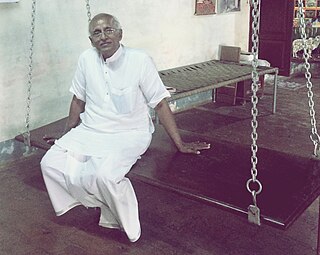
Karaikudi Sambasiva Iyer Subramanian is a veena player in the Karaikudi Veena Tradition. He is the grandson of Karaikudi Subbarama Iyer and adoptive son of Karaikudi Sambasiva Iyer.
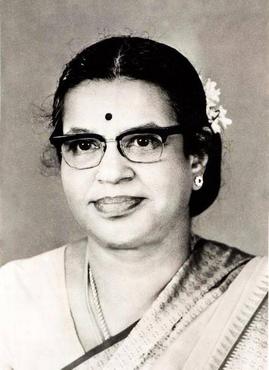
Ambujam Krishna was a composer of Carnatic Kritis. She has composed more than 600 kritis in various Carnatic ragas.
References
- 1 2 3 4 5 6 "Carnatic musician Ananthalaksmi Sadagopan no more". The Hindu . 17 May 2013. Archived from the original on 9 March 2021. Retrieved 14 March 2022.
- 1 2 Arunn Narasimhan and T. T. Narendran. "Tribute: Ananthalakshmi Sadagopan" (PDF). Archived from the original (PDF) on 13 November 2021. Retrieved 14 March 2022.